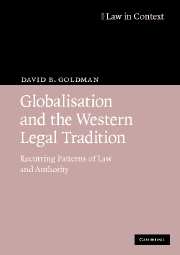Book contents
- Frontmatter
- Contents
- Preface
- 1 Introduction
- Part 1 Towards a Globalist Jurisprudence
- Part 2 A Holy Roman Empire
- Part 3 State Formation and Reformation
- Part 4 A Wholly Mammon Empire?
- 8 The constricted universalism of the nation-state
- 9 The incomplete authority of the nation-state
- 10 The return of universalist law: human rights and free trade
- Part 5 Competing Jurisdictions Case Studies
- Bibliography
- Index
8 - The constricted universalism of the nation-state
Published online by Cambridge University Press: 30 March 2010
- Frontmatter
- Contents
- Preface
- 1 Introduction
- Part 1 Towards a Globalist Jurisprudence
- Part 2 A Holy Roman Empire
- Part 3 State Formation and Reformation
- Part 4 A Wholly Mammon Empire?
- 8 The constricted universalism of the nation-state
- 9 The incomplete authority of the nation-state
- 10 The return of universalist law: human rights and free trade
- Part 5 Competing Jurisdictions Case Studies
- Bibliography
- Index
Summary
A constitutional legacy of the Protestant reformers was the increasingly absolutist, territorial state, aided by the innovative legislative mentality. The universalist legal pluralism of Christendom fractured into states and territories claiming legal monopolies. Generally these monopolies were grounded in the natural rights of people living together in a territorial compact to protect themselves from both within and without. As late as the eighteenth century in France, the divine right of kings to govern still served this function. Out of that repression burst the French Revolution and codified rights universal in aim but national in application. Conventional legal and political theory locates the sovereign authority of the state in the social thought of the English and French Revolutions. International law at those times was universal to the extent that it tended to reflect a system of norms of the lowest common denominator in a schoolyard of states administered by bullies. Theorists continued to explore universal international and territorial authority, constricted by the relativism inherent in competing nation-states determined, like their constituents, to pursue their own economic and political aspirations. Thus the inquisitive child of our Introduction can be told by the adult today that law is obeyed because it comes from the state and it is justified because it brings order to the pursuit of economic needs.
In this chapter, we shall see how the aspirations of the nation-state ascended as a strategy for central authority, and how the ‘codification mentality’ assisted that purpose. Despite formidable codifiers preceding him – for example, God (via Moses) and Emperor Justinian – Napoleon was to find his people no more adept at accepting his law without expansion, reform, clarification and debate.
- Type
- Chapter
- Information
- Globalisation and the Western Legal TraditionRecurring Patterns of Law and Authority, pp. 173 - 195Publisher: Cambridge University PressPrint publication year: 2008



